February 1, 2016
Author’s note: recent comments by Donald Trump’s spokesperson about other politicians being “half-breeds” reminded me of how the “Death Eaters” in the Harry Potter series focused on the necessity of having “pure blood”; apparently J.K. Rowling thought the same:
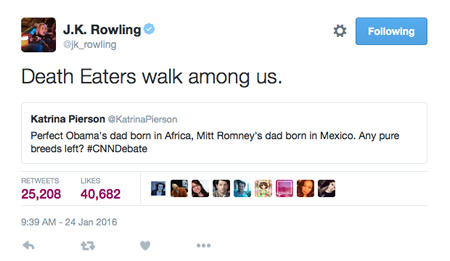
Ironically, Trump’s mother was born in Scotland, hence he’s also a “half-breed”. The following story arose from ruminating on this further.
 Bernie never became accustomed to the noise of the bus engine. He had rolled up a grey acrylic blanket and pressed it up against the cool window and then lay his head on it. Though his eyes were shut, he couldn’t sleep. Every time the bus accelerated, the engine revved, and the resulting vibration shook the entire vehicle.
Bernie never became accustomed to the noise of the bus engine. He had rolled up a grey acrylic blanket and pressed it up against the cool window and then lay his head on it. Though his eyes were shut, he couldn’t sleep. Every time the bus accelerated, the engine revved, and the resulting vibration shook the entire vehicle.
The bus revved yet again. Bernie grimaced. He knew, in principle, how the engine worked: fossil fuel flowed into the engine, combusted, and pistons moved up and down in response. More carbon was pushed into the atmosphere and the world suffocated a little bit more.
Bernie winced. He wondered if anyone would observe him sleeping: perhaps the small flock of journalists or his staff? Certainly, there was Megan, his aide: she wore power suits and cream blouses and her auburn hair was so straight as to seem like it had been pressed with a steam iron. She seemed to be there whenever he opened his eyes, telling him about some appointment or another. With his eyes shut, he knew, he was just another old man, asleep and dreaming.
The engine revved once more. Bernie was tempted to open his eyes and look out at the scenery. However, this was western Ohio, and he knew that all he would see were endless flat horizons, a few homes, and only a few trees just beginning to be touched by autumn’s bright colours. Winds flicked at the dry stubble of harvested corn.
He sighed. In his younger days transport was so much easier. He had a Nimbus 1000 broom tucked away in his closet, next to his collection of faded white canvas sneakers. He’d open the closet, extend out his hand and the broom would rush to be grasped by him. Involuntarily, Bernie would smile. Then he’d open the window to his bedroom, breathe in the cool night air, hop on, and then fly out towards the smoky Manhattan skyline.
“If you want to lead a Muggle life, you have to live like a Muggle,” a memory whispered.
Bernie fell into sleep fully and the grey mists around the memory lifted. He could see a face framed by a long grey beard. The accent was British: English? The brown eyes twinkled. The man wore ornately woven silver grey robes that flowed to the floor.
“Yes, Professor Dumbledore,” Bernie had replied. He was seated at a wooden desk; his crimson and gold tie was loose around his neck. His wand, made of polished cedar with a hippogriff feather core, rested in front of him alongside an open Potions book. He knew that his worn and dog-eared copy of “Democracy in America” was tucked into the pocket of his brown leather satchel resting at his feet.
“You can do great things, Bernie,” the Professor continued, “special things, even things that are seen as magical…but they don’t have to be magic.”
Bernie had nodded in reply. When was this? It was a very long time ago, to be sure. It must have been his third or fourth year at Hogwarts. His memory extended further back to a day when an owl had alighted on the windowsill of his family’s apartment in Brooklyn. The window was open, the endless noise of traffic and honking horns rose from the city as did the scent of burning fuel. Golden sunlight bounced off the buttermilk coloured walls of the kitchen. Bernie had been sitting at the table that had a red and white checked cloth covering it, fishing out the last Corn Flake and the final drops of milk out of a white ceramic bowl with an oversized spoon. He’d heard the flutter of wings and turned to see where the sound had come from: the owl had light brown feathers and was clutching a parchment envelope in its beak. It blinked its big dark eyes, waiting.
“Papa,” a voice said. It was his older brother Larry. He too was finishing up his cereal: he had curly brown hair, wore a grey shirt and was pointing at the bird with his spoon.
Papa put down his copy of the New York Times: his silver wire frame glasses were perched on the end of his nose. He looked at the owl.
“Ah, it’s come,” Papa said mildly. He got up and went over to the owl and took the envelope.
“Thank you,” he said to the bird. The owl dipped its head and flew off towards Manhattan. Papa cracked the red wax seal on the letter and read it. The sunlight shone through the parchment, illuminating delicate black calligraphy.
“What’s going on, Papa?” Bernie had asked.
“It’s a letter, Bernie…you’re going to school.”
“P.S. 197?”
Papa had chuckled. “No, Bernie…not there.” Mama looked at him: her deep brown eyes were downcast.
Papa told him that he was a wizard. Mama wasn’t one, so Papa had decided to lead the “Muggle life” in Brooklyn.
“What does Muggle mean?” Bernie had asked.
“Non-magical,” Mama had interjected. There was a dissonant note in her voice; it was usually so musical.
Muggle. Bernie didn’t like the word. Surely we were all equal.
Papa told him other things. The old cherry wood wardrobe with the slightly cracked mirror and the tightly locked door in the spare bedroom was a portal to England. Don’t worry, Bernie was told, Larry would be there to help him get settled. A hat would be placed on his head and he’d be placed into a “house”; really with his brains he should get Ravenclaw like Larry did. Professor Dumbledore was the best headmaster there had ever been; you’ll recognise him, he looks a bit like Rabbi Silverstein.
That September, there had been the stepping into the wardrobe with Larry, the darkness, the scent of dust and mustiness, the slight whooshing sound, and stepping out into a London morning from a broom cupboard. Bernie was wide eyed: he looked up and saw the sun gleaming through the glass and iron roof.
“King’s Cross Station,” Larry told him. “Come on.” They ran towards a giant black and red train, hissing with steam. Kids in black robes and coloured ties, carrying huge amounts of luggage were talking with parents in strange accents. Birds were in cages. Cats meowed.
“Come on,” Larry repeated. He produced two tickets from his pocket: they were also made of parchment, stamped on in crude black letters, “Hogwarts Express”. Larry and Bernie jumped onto the train and hustled their way down the corridor; after a quick search, they found an empty compartment. The compartment smelled like an old library to Bernie, with that slight vanilla tinge of ancient books. The other kids filed onto the train, laughing, jabbering, talking. A whistle blew. Bernie pressed his face up to the window.
“We’re about to leave,” Larry explained.
A young girl knocked on the compartment door. She seemed to be about Bernie’s age and had frizzy red hair. She wore a similar outfit to Bernie: black gown, white shirt, black necktie. Larry gestured: come in. She nodded, opened the door, shut it behind her, and sat opposite Bernie.
What big brown eyes she has, Bernie thought.
“Hi,” Bernie said.
“Hello,” she said in her strange accent, “I’m Molly. Molly Prewett. Who are you?”
“Bernie,” he replied. “…this is my brother Larry.”
Larry gave her a small wave.
“Bernie,” she repeated. “Where are you from?”
“Brooklyn.”
“Where’s that?”
“New York. America.”
“I’ve never been to America.”
“I’ve never been to…where are we going?”
“Scotland. ”
“Yeah.”
“Do you know what house you want to get into?”
“Not really…Larry is in Ravenclaw, he’s really smart…I don’t really know much about the others.”
Molly looked down. “I’m hoping for Gryffindor. My parents were in it.”
“Where are they?”
Molly met Bernie’s gaze. Her eyes glistened. “They couldn’t make it today.”
Bernie shifted slightly in his seat. “So what’s so good about Gryffindor?”
Larry spoke up. “It’s for the recklessly brave people.”
“Courageous, one might say,” Molly interjected.
Larry smirked.
“I don’t think I’m that brave,” Bernie said.
Molly reached across and grasped his hand; Bernie nearly jumped. “I think you could be, Bernie,” she said.
—
“Senator?”
No, don’t disturb me now, Bernie thought.
“Senator?” More insistent this time, he noted.
All right.
Bernie opened his eyes.
“Yes, Megan?” he asked.
“We’re just pulling into Dayton, sir. Would you like a cup of coffee?”
“That’d be great, thank you. Black, no sugar.”
Megan proceeded gingerly down the bus to get the drink. Bernie stretched out his arms. A slight click. He could have said a charm and made all his joints supple again.
“If you want to lead a Muggle life, you have to live like a Muggle…”
Yeah. No magic. Or at least not that kind.
“Megan!” he shouted down the bus, “please get me an aspirin while you’re at it!”
—
Bernie had been to a lot of universities over the past 18 months. They mostly fit into the same pattern: the carefully trimmed lawns, the main administration building suitably grand, often with Romanesque pillars, inspiring the standard issue awe. After the use of an Obliviate charm to wipe out his magical past, he’d gone to the University of Chicago: he was just another skinny kid with glasses, wearing blue jeans and an old sweater and carrying a dog-eared copy of “Democracy of America” in his bag. He’d become another student. Life carried on.
The bus pulled up in front of the auditorium, the brakes screeched. Bernie got up and pulled his grey wool jacket on around him. He felt the slight bump from his inside pocket against his chest. His wand was too potent to be hidden anywhere else.
“We’re here, Senator,” Megan said. Bernie nodded.
“All right, let’s do this,” Bernie said, clapping his hands together. Staffers, invariably young, bright eyed, fresh faced all looked at him and smiled. The boss was going to do this. He was going to turn the tide.
If only I was so confident, Bernie thought. It was like America wanted to drink deep of fear and anger. He took a deep breath.
“I think you could be brave, Bernie…” Little Molly’s words echoed in his memory. He didn’t believe her when she said it, but when he felt the Sorting Hat wriggle on his head, he looked directly at her. She was already sitting with the Gryffindor; it had taken all of five seconds for her to be placed there. Her eyes were bright, her lips upturned in a smile.
“Interesting,” the Sorting Hat had said, “a fine mind like your brother…hard worker…you could be brave…GRYFFINDOR!”
Molly had jumped up and clapped. Bernie smiled in reply.
—
Bernie and his staffers ascended the stairs to the auditorium. Like a plague of Cornish pixies, members of the press corps were floating around him, peppering him with questions, shoving microphones and cameras in his face.
“Senator! Senator! The latest poll puts you ten points behind! What do you have to say?”
“Is this a failed crusade, Senator?”
“What will you be telling us tonight?”
Bernie exhaled. It was one of those moments in which he wished he could fish out his wand and cast a Silencio spell. No. Dumbledore had said he could do “things that are seen as magical…but they don’t have to be magic….”
Bernie paused at the top of the stairs, and turned.
“Before I go in,” he said, “there is one thing I’d like to say.”
Be brave, Molly’s voice echoed in his memory. What had happened to her? Oh yeah, in third year, she’d fallen in love with that Arthur guy with the messy red hair. Oh well. She’d never have walked along Brighton Beach with him, eaten a salty pretzel, nor gone to synagogue, nor married him underneath a white canopy. Ah, but that was when he truly believed. Those days were long gone.
Be brave. OK.
“The polls are not everything. They are not going to deflect us from telling the truth. The American people deserve better than fear and hatred. They deserve better than to hear that they ought to put up walls against their neighbours, that the answers to their problems lay in blaming others. We are one country, and we will keep talking about solutions for the whole country. Thank you!”
Bernie turned, pushed open the auditorium’s doors with one shove, his shoulder clicking again and he stepped inside.
—
“Really, Senator, it’s not that bad.”
Bernie was seated in a chair, a white barbershop smock tied around his neck. A young blonde woman wearing sepia lipstick was bustling around him, applying pancake makeup.
“Megan, some looks can’t be improved,” Bernie interjected, “Get me out of here.”
“You’ll look washed out on television if you don’t do this. Pale. Sick.”
Bernie sighed. He had worked towards this moment, as unlikely as it had seemed. The other guy represented everything he’d fought against for his entire career. The other guy was more than a person, he was a series of ideas, very bad ones. Now he’d have a chance to argue against them. Maybe, just maybe, the force of reason would prevail. Maybe, just maybe, light would banish the darkness.
Papa hadn’t understood Bernie’s career choice. “You have such a gift…” Bernie was told he could have a career as a Potions Master. He’d once tried to create a Liquefied Rainbow elixir, so he could make one shine near Molly’s doorway. Theoretically, he’d just have to place one drop on the side and it would arch in front of her as she stepped out. However, he’d misunderstood the metric measurements and created such a powerful rainbow that it shot through the glass of the classroom and illuminated the sky over Hogwarts for a good hour. “Merlin’s beard, Bernie!” the Potions Master had exclaimed; he was a flurry of brown tweed as he rushed to look out the window. Bernie had been scared, oh no, will I be expelled? But, then the rest of the students emerged into the courtyard, looked up and smiled. Despite himself, the Potions Master had smiled as well. Bernie then allowed himself to grin too.
Gone, all gone. Now there was the scent of makeup and powder, the steady hum of the air conditioning. The light of the room seemed less vivid than memory.
“You are well prepared for this, Senator.” Megan said.
True. He’d gone to the home he’d made among the green forests, tall mountains and clear lakes, not quite like Scotland, but there was an echo of that beauty. In a remote hotel, he had practiced in the dining room, which had a big blue and white sign at the back advertising pancakes with maple syrup made from local trees. He and Steve and Barry and Megan had tried to answer hard questions, and interspersed the replies with jokes. They’d talked until Bernie’s throat hurt, soothed with cups of chamomile tea and then they talked some more. The day faded into night, the dining room was illuminated with fluorescent lamps and eventually the coffee wasn’t keeping them awake. To bed, to bed, they said, and back early to argue some more. Then came the moment when they couldn’t think of anything else to say. Ready.
“I’m done,” the makeup artist said.
Bernie grinned. “Thanks for doing your best, I’m sorry that the canvas isn’t as good as the painter.”
The artist smiled. “Good luck tonight, Senator. ”
“Thank you.”
—
“There’s a lot of people out there,” Megan said, “mostly students, and we know they break in your direction.”
Bernie nodded. They were standing behind the thick blue curtain. Apart from a few flickering screens and the lights of the amplifier equipment, it was dark. The faint scent of electricity and dust was in the air. He shut his eyes, exhaled.
“When will my family be here?” Bernie asked.
“They’re due to arrive just before the debate begins, Senator,” Megan replied. “Sorry, we’ve had problems with air travel recently.”
Get a broom, Bernie thought wistfully. He nodded.
It hadn’t been easy to lead the Muggle life. Everyone has secrets, he pondered, but being able to levitate furniture and yet shifting it by hand, even when his knuckles hurt and his shoulder strained, was stretching a secret to near breaking point. He’d done it, however. The wand stayed tucked in his inside pocket. Sometimes, when he was alone, he’d take it out, admire its polished surface, feel its willingness to cast spells. He checked if he still had the necessary flick of the wrist. Always, yes.
Footsteps. Bernie detected the sound of several sets of expensive shoes pounding against the hard wooden floor.
“He’s here,” Megan said softly.
Bernie looked. He’d never met the other guy before. He wanted to believe that there was a spark of humanity in everyone and all of us had merit and worth. If we traveled down the back alleys of individual pain and hatred, Bernie thought, we would find that the tendency to do evil stemmed from illness, a distortion of the soul, not a birthright. Surely that had to be so.
Difficult. The other guy swaggered in: his footsteps swayed as he stepped forward, like he was an experienced gunslinger entering a saloon in an old film. His chin, jowly, was tilted upright. His grey blonde hair (was it real?) was tousled on top of his head. He was sweating slightly; the makeup artist had rendered his flesh tone a peculiar cross between orange and pink. An overwhelming blast of rich sandalwood cologne emanated from him, mixed with the scent of his wool suit. A small American flag badge was pinned to his lapel. The brightest thing about him was his red silk tie: it was finely woven and brilliantly reflected the dim light. His small eyes glittered in the dark. Bernie thought of nocturnal predators he’d seen in nature documentaries.
“Senator,” the other guy said.
Bernie nodded. Ten points up in the latest poll and this guy knows it, he thought.
“Senator,” Megan whispered and nudged him slightly. The moderator had taken his seat at a long desk in front of the stage. The moderator, Bernie noted, was a slim, grey haired man who wore black plastic framed glasses and a dark suit.
“We’re on!” a voice whispered in the darkness.
“Welcome to the auditorium at Wright State University, here in the beautiful city of Dayton, Ohio,” the moderator said, “for the first of our Presidential debates…”
“May the best man win,” the other guy said. He smirked.
Be brave.
—
Bernie delivered his opening statement with more force than he intended. It was wrong, terribly wrong, he said, that so many people were struggling while billionaires at the top of the heap were getting an ever increasing share of the country’s wealth. His plan, he added, would redress the balance and restore the middle class, which would bring justice for hard working families.
As he spoke, Bernie thought of how many times he had said something similar. How many times had he tried to be just? Be brave. Be just. Try to make the world better. He’d lose his temper and swear sometimes. In the evenings while he was at the University of Chicago while laying on his creaking, thin dormitory bed he’d pull his wand out of his jacket and think about how he could make injustice disappear like magic.
No, he’d led a Muggle life and thus had to live like a Muggle. The wand stayed tucked away. The copy of Democracy in America became more faded and worn. A quote stuck with him, “Nothing is more wonderful than the art of being free, but nothing is harder to learn how to use than freedom.” He had to keep trying. He’d march, he’d speak, he’d protest, he’d run for office. In contrast, Larry had never gotten over Hogwarts and went back to England to try and lead the Muggle life there.
Bernie could have waved his wand and made the audience believe. But that wasn’t his life. He had to use words, thoughts, reason. He finished, his throat a bit sore, with a “Thank you.”
“Thank you, Senator,” the moderator said. He nodded at the other guy.
The other guy began by talking about making America great again and Mexico paying for a wall to imprison its own citizens. It was the same nonsense as he had said so many times before. Bernie listened carefully. What made it so powerful? Why was he ten points ahead in the polls? He didn’t dare look at him at first, lest somehow the incoherent nonsense would impact his own train of thought. Rather, he peered at the audience: semi-concealed by the darkness, he could see hopeful faces, various ages and races, people in white t-shirts, tan jackets, wearing colourful jerseys. As the other guy spoke, their expressions softened, they began to applaud the ridiculous sound bites.
What? Bernie turned to look at his opponent.
Wisps of black smoke were coming out of the other guy’s mouth as he thundered on about the iniquities of the current President, foreign policy, foreign workers. The smoke was slowly sliding across the auditorium floor and swirling around the audience. They were breathing it in. The smoke touched the television cameras: they were unmoved. The smoke penetrated them.
Bernie looked intently at the other guy. He was still speaking, the smoke that was coming out of his mouth was becoming more intense. Wait a minute.
Bernie reached into his inside pocket, grabbed the wand, flicked his wrist, and shouted “Tempus!”
The audience froze. The other guy stopped speaking. The quiet was deafening; even the air conditioner had halted due to the spell.
The other guy smirked. “I wondered when you’d figure it out,” he said.
“You!” Bernie said. “Who are you, really?”
“Oh come on, Bernie, think back. You’ve seen me before.”
Bernie studied his face. Yes, subtract the years off, go back to a day when the blonde hair was authentic rather than plastered on, the same arrogant air: yes, he had seen him.
Bernie remembered during his fifth year when a group of new students were brought in before the Sorting Hat. One blonde boy was actively punching the brown haired boy next to him in the arm. “You’ll never be anything, Longbottom!” he’d shouted in a New York accent, “you’re a loser!” Dumbledore stared at him fiercely over the top of his glasses.
“Donald!” Dumbledore shouted, “stop that at once, you’re next!”
Donald froze, his eyes were wide. He nodded.
Professor McGonagal held up the Sorting Hat as Donald slowly took his place on the dais. The hat took one look at Donald: “You don’t need to put me on his head, Professor: SLYTHERIN!”
—
“Now you remember,” Donald said.
“Yes, I do,” Bernie replied. He held his wand at the ready. It was warm, prepared for combat. “You chose to lead a Muggle life but use your magic. That’s cheating.”
“It’d be stupid just to sit on all that power.”
“That’s why you were allowed to go bankrupt four times and you didn’t lose your fortune,” Bernie added, “that explains why you’ve had so many people eating out of your hands. That’s how come you’re ten points ahead when all you’re saying is garbage. That’s how come you got so much adoration despite being so damn terrible.”
Donald grinned. “Terrible? I’m the best. And I learned from the best.”
Donald rolled up his sleeve, undoing the gold and diamond cufflink that secured his white Egyptian cotton shirt. There was a tattoo of a black skull with a snake as a tongue.
The Dark Mark! Bernie thought.
“Voldemort is dead!” Bernie shouted.
“Oh Bernie, he may be dead, but his ideas live on…and I’m going to fulfil his vision of Muggles serving magic. Accio, wand!”
A black wand flew out of the darkness into Donald’s hand. He touched the tip of it to his tattoo: the snakes moved on his forearm, slithering and writhing. Bernie heard the distant sound of thunder.
“This ends now, Bernie,” Donald said.
“Yes it does. Stupefy!” Energy flew out of Bernie’s wand.
Donald deflected the shot. “You’ll have to do better than that.”
“Expelliarmus!” A red bolt blasted forward.
Again, a deflection: the bolt slammed into the ceiling, leaving a slight scorch mark. “My turn,” Donald said, “Avada…”
“Stupefy!” The spell hit Donald from the audience, square in the chest. He fell, stunned, silent. It reminded Bernie of a tree collapsing after it had been chopped down. Donald landed on his face.
Bernie turned. Who did that?
“Hello?!?” he shouted.
Footsteps resounded out of the darkness. A figure slowly emerged into the light. His saviour wore a royal blue “Bernie 2016” cap, a denim jacket, a brightly coloured patchwork dress. A brilliant shock of frizzy red hair flowed from out under the cap onto her shoulders.
Bernie gasped. “Molly?” he asked.
She pulled off the cap. Yes, she had aged, but the hair, the smile and the eyes were the same. For a moment, he saw the little girl who sat across from him on his first train ride to Hogwarts.
“Hello, Bernie dear,” she said, her eyes twinkling, “it’s been a long time.”
—
They sat together on the stairs leading up to the platform. “You got married?” Molly asked.
“Yes, twice. Fortunately, it took the second time.”
“Grandchildren?”
“Yes! And you?”
“Me too.”
Bernie couldn’t restrain the question any longer. “How did you know to come here, Molly?”
Molly reached out and touched Bernie’s cheek. Her fingertips were cool and delicate. “I didn’t, dear. I just wanted to see how you were getting on. You’ve been so brave.”
Bernie smiled. “I’m so out of practice.”
“Never mind.”
They paused.
“What are you thinking about?” Molly asked.
“It’s funny how I’ve tried to turn my back on the past…but the past always pivots with you, you can’t get rid of it.”
“It’s for the best, dear, would you really want to forget?”
Bernie smiled and clasped Molly’s hand. “Nah.”
Molly grinned, then nodded towards Donald. He was still on the floor, face down, with his sleeve rolled up. “What should we do with him?”
“Well, we can’t let a Death Eater become President of the United States.”
“No, we can’t…my son is an Auror, should we call him? Should we get Donald sent to Azkaban?”
“No, that would create too many holes, too many questions…besides it’s his ideas that are truly dangerous. We need to find another way.”
Molly stood. Bernie got up as well. They aligned themselves to be side by side, like the two children they once were. Together, they contemplated Donald’s still form.
“Poor, poor Donald,” Molly said.
“He’s not poor. He used magic in the Muggle world to take things that didn’t belong to him. Property, people, money.”
“He’s poor in this sense, Bernie dear, he never did anything honestly. Even his hair is a lie.” She pointed at the top of Donald’s head. “Look at that preposterous thing.”
Bernie pursed his lips.
“I have an idea,” he said.
—
Donald awoke. He was still on stage. His sleeve was intact. Had he blacked out? Had he revealed himself to Bernie? Didn’t seem like it, Bernie was still talking about his socialist, “We Are the World” crap. The audience applauded.
Must have been a dream, Donald reasoned. Have to stop drinking that stupid champagne that’s only $300 a bottle. It isn’t quality.
“Would you care to reply?” the moderator asked him.
Donald whispered to himself, Confundo. The power wouldn’t come. What?
Instead, he spoke normally. Mexicans are a damn burden, he said, sending rapists and criminals across the border. We need to keep Muslims out. We need to make America great again. We’d win so much that we’d get bored of winning.
But the audience wasn’t responding. The women’s hearts weren’t beating faster. The power wasn’t reaching out to the television audience.
What?
—
Bernie whispered the counter spell. The audience was looking at Trump with glittering eyes. There was Molly, in the back row, her Bernie 2016 cap pulled down tight on her head again. He gave her a slight nod.
She whispered “Deprimo” and the air conditioner began to blow onto the stage with extreme force. Papers blew up from the moderator’s desk and the podiums into a storm of the printed word.
“We seem to be having a technical problem!” the moderator shouted.
The wind rose. The flagpoles positioned behind the podiums fell over. The power of the wind buffeted the set as if invisible fists were punching it.
Donald tried to crouch out of the way. There was a tearing sound: his blonde and grey wig ripped off his head and blew up against the nearest wall. It stuck; its artificial fibres were hopelessly tangled.
Bernie nodded slightly. Molly stopped. The wind ceased. Donald stood motionless on international television, now bald. The dome of his bare pink head glistened with sweat in the bright light. His eyes were wide. For a moment, Bernie saw the little boy that froze in fear before Professor Dumbledore.
Donald let out a blood curdling and incoherent yell. He ran off the stage, his heavy footsteps audible as he exited as fast as he could. Bernie took his place back at the podium. He saw Molly smiling at him in the darkness. As he gripped the podium, he thought, “this is happening…in this moment, right now, I may have become President.”
Be brave. Be just.
Bernie took a deep breath.
“Well,” the moderator said, straightening his hair and glasses. He looked at Bernie with a questioning gaze. What just happened?
Bernie tried to look reassuring: he smiled. “Well, Coop,” Bernie asked, “does that count as a forfeit?”
“I think so, Senator…thank you to you, and to the audience here in Dayton.”
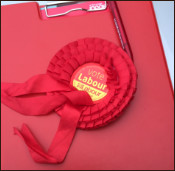 The dark clouds obscured the twilight. Rain was falling steadily, large drops bounced off the hood of my olive green jacket. I accidentally cut my finger: it didn’t hurt, but it was one of those irritating lacerations that wouldn’t stop bleeding. I covered it with my thumb as I grasped my stack of leaflets tightly. My colleague and I continued our steady pace up the street: folding the unbloodied leaflets, approaching the door, stuffing the newsletter through the letterbox.
The dark clouds obscured the twilight. Rain was falling steadily, large drops bounced off the hood of my olive green jacket. I accidentally cut my finger: it didn’t hurt, but it was one of those irritating lacerations that wouldn’t stop bleeding. I covered it with my thumb as I grasped my stack of leaflets tightly. My colleague and I continued our steady pace up the street: folding the unbloodied leaflets, approaching the door, stuffing the newsletter through the letterbox.

 Bernie never became accustomed to the noise of the bus engine. He had rolled up a grey acrylic blanket and pressed it up against the cool window and then lay his head on it. Though his eyes were shut, he couldn’t sleep. Every time the bus accelerated, the engine revved, and the resulting vibration shook the entire vehicle.
Bernie never became accustomed to the noise of the bus engine. He had rolled up a grey acrylic blanket and pressed it up against the cool window and then lay his head on it. Though his eyes were shut, he couldn’t sleep. Every time the bus accelerated, the engine revved, and the resulting vibration shook the entire vehicle.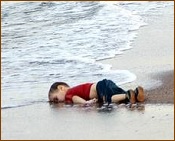 The story could have had a different outcome. With an alternate set of policies and priorities, 3 year old Aylan Kurdi might have lived. He could have settled in Bedford or Peterborough, gone to school, torn holes in his navy blue jumper, gotten scrapes on his knees after falling off his bike, done well on his GCSE’s while his parents worked in a local hospital or supermarket. He could have become a doctor, lawyer or engineer. He could have paid taxes and served as a school governor. He could have touched lives and made them better. He was full of potential. But this isn’t the world he was living in: his fate was to end up on a Turkish beach, face down, looking more asleep than dead as the cool waves of the Mediterranean washed over him.
The story could have had a different outcome. With an alternate set of policies and priorities, 3 year old Aylan Kurdi might have lived. He could have settled in Bedford or Peterborough, gone to school, torn holes in his navy blue jumper, gotten scrapes on his knees after falling off his bike, done well on his GCSE’s while his parents worked in a local hospital or supermarket. He could have become a doctor, lawyer or engineer. He could have paid taxes and served as a school governor. He could have touched lives and made them better. He was full of potential. But this isn’t the world he was living in: his fate was to end up on a Turkish beach, face down, looking more asleep than dead as the cool waves of the Mediterranean washed over him.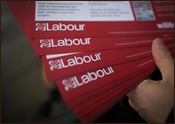 My black suit was clean and pressed. My white shirt with a herringbone pattern embedded into its weave had been ironed. A silk maroon tie was neatly tucked underneath my stiff collar, tied into a Windsor knot. The head of fresh red rose was pinned to my lapel. I had shaved around my beard that morning and I still felt the slight sting of the lotion I applied afterward. I was nervous, I was hopeful: it was a sunny, warm August morning and I was about to go into the offices of Unite the Union to be interviewed to be a potential Labour candidate for next year’s local election.
My black suit was clean and pressed. My white shirt with a herringbone pattern embedded into its weave had been ironed. A silk maroon tie was neatly tucked underneath my stiff collar, tied into a Windsor knot. The head of fresh red rose was pinned to my lapel. I had shaved around my beard that morning and I still felt the slight sting of the lotion I applied afterward. I was nervous, I was hopeful: it was a sunny, warm August morning and I was about to go into the offices of Unite the Union to be interviewed to be a potential Labour candidate for next year’s local election.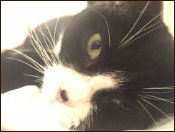 I was probably the last human being to see my cat Amelia alive. It was a bright August morning: the coffee maker was gurgling away as it pushed hot water through the freshly ground beans. The kitchen was imbued with the scent of banana flavoured porridge which was just out of the microwave. The sun was shining: I looked out the kitchen window and could see blossoms of magenta, white and blue in the garden, and the golden morning light blazing onto the flat land. Distant white windmills turned in the stiff breeze. It was difficult to believe that anything particularly bad could happen on such a day.
I was probably the last human being to see my cat Amelia alive. It was a bright August morning: the coffee maker was gurgling away as it pushed hot water through the freshly ground beans. The kitchen was imbued with the scent of banana flavoured porridge which was just out of the microwave. The sun was shining: I looked out the kitchen window and could see blossoms of magenta, white and blue in the garden, and the golden morning light blazing onto the flat land. Distant white windmills turned in the stiff breeze. It was difficult to believe that anything particularly bad could happen on such a day.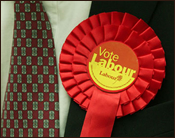 Democracy, contrary to what some may think, is not just about mentions in the press, appearances on television or cleverly contrived advertising campaigns. Often, its processes take place in humble locations among relatively small groups of people: just so, otherwise supposedly representative government would become solely a product of the media, who would spoon feed us their perspective along with whatever messages were being conveyed. It can be argued that one of the reasons why the Tories won the 2015 General Election is precisely because too much of politics was conducted on the minefields the media constructed.
Democracy, contrary to what some may think, is not just about mentions in the press, appearances on television or cleverly contrived advertising campaigns. Often, its processes take place in humble locations among relatively small groups of people: just so, otherwise supposedly representative government would become solely a product of the media, who would spoon feed us their perspective along with whatever messages were being conveyed. It can be argued that one of the reasons why the Tories won the 2015 General Election is precisely because too much of politics was conducted on the minefields the media constructed. East Anglia’s summer is at its height. The flat land doesn’t readily retain its temperature, so the evenings are generally cool: the moment the sun tucks in over the horizon, the heat left over from the day rises up from the lawn and the fields full of growing sugar beets. An open window lets in fresh breezes and the sounds of cars traversing a nearby country road. In contrast, when morning approaches, summer’s intensity strikes quickly; the first rays of dawn appear not long after 4:30 AM. Occasionally, my cat Amelia will cry out to me at that time: having spent a night out hunting, she wants to get back into the house before the sun rises. I open a window on the ground floor: immediately I see a black and white blur zip past me and she lands on the carpet with a soft thud. Amelia then looks up at me with her yellow green eyes and drops a dead mouse near my feet. I tell her thank you and get the garden shovel to perform another impromptu burial near the rose bushes.
East Anglia’s summer is at its height. The flat land doesn’t readily retain its temperature, so the evenings are generally cool: the moment the sun tucks in over the horizon, the heat left over from the day rises up from the lawn and the fields full of growing sugar beets. An open window lets in fresh breezes and the sounds of cars traversing a nearby country road. In contrast, when morning approaches, summer’s intensity strikes quickly; the first rays of dawn appear not long after 4:30 AM. Occasionally, my cat Amelia will cry out to me at that time: having spent a night out hunting, she wants to get back into the house before the sun rises. I open a window on the ground floor: immediately I see a black and white blur zip past me and she lands on the carpet with a soft thud. Amelia then looks up at me with her yellow green eyes and drops a dead mouse near my feet. I tell her thank you and get the garden shovel to perform another impromptu burial near the rose bushes. There is also the lure of tradition. Whilst in Tunisia, I bought a ceramic tile which had the first verse of the Quran painted onto its surface. As I don’t read Arabic, I made sure to check with Arabic speaking friends later on to ensure it wasn’t actually a brownie recipe. By far and away the most impressive buildings I saw in Tunisia were the mosques: you can have your mobile phone or perfume pulled out of a glass cabinet, but this was where the quotient of majesty lay, apart from what nature had to provide. Having asked what a seemingly beneficent God wanted of them, it appears that some Tunisians accepted the answer provided by malevolent men. For a time at least, the hotel in which we stayed will fall silent, the waiters will have much fewer guests to serve the fine red wine, the hawkers and traders will have fewer people to convince that they have relations in Sheffield and upon whom to try out their Bruce Forsythe impressions (“To see you, nice!”). Work will dry up. People may go hungry; they will become angry and wonder who to blame.
There is also the lure of tradition. Whilst in Tunisia, I bought a ceramic tile which had the first verse of the Quran painted onto its surface. As I don’t read Arabic, I made sure to check with Arabic speaking friends later on to ensure it wasn’t actually a brownie recipe. By far and away the most impressive buildings I saw in Tunisia were the mosques: you can have your mobile phone or perfume pulled out of a glass cabinet, but this was where the quotient of majesty lay, apart from what nature had to provide. Having asked what a seemingly beneficent God wanted of them, it appears that some Tunisians accepted the answer provided by malevolent men. For a time at least, the hotel in which we stayed will fall silent, the waiters will have much fewer guests to serve the fine red wine, the hawkers and traders will have fewer people to convince that they have relations in Sheffield and upon whom to try out their Bruce Forsythe impressions (“To see you, nice!”). Work will dry up. People may go hungry; they will become angry and wonder who to blame. The nominations for the Labour leadership and deputy leadership elections are now closed. As much as one may wish for more contenders to enter the race, rules are rules: one can’t write in “Keir Starmer” or “Dan Jarvis” on the ballot. Despite the many reservations which I’ve articulated previously, I’ve had time to think about for whom I will be voting.
The nominations for the Labour leadership and deputy leadership elections are now closed. As much as one may wish for more contenders to enter the race, rules are rules: one can’t write in “Keir Starmer” or “Dan Jarvis” on the ballot. Despite the many reservations which I’ve articulated previously, I’ve had time to think about for whom I will be voting.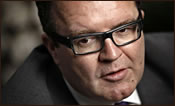 Tom is not without his problems. He was damaged by the expenses scandal: in 2009, he allegedly claimed £4800 for food, and between 2005 and 2009, along with Iain Wright, MP for Hartlepool, he claimed £100,000 for expenses associated with renting a flat . More recently, he had to resign from his role as deputy chairman of the Labour Party in 2013 due to his supposed involvement in the fracas regarding the selection of the candidate for Falkirk. There is a perception, rightly or wrongly, that he is a bruiser equipped with a sharp pair of elbows. If he became Deputy Leader, no doubt the tabloids would have a field day, particularly the Murdoch titles which are still smarting from the wounds he inflicted upon them.
Tom is not without his problems. He was damaged by the expenses scandal: in 2009, he allegedly claimed £4800 for food, and between 2005 and 2009, along with Iain Wright, MP for Hartlepool, he claimed £100,000 for expenses associated with renting a flat . More recently, he had to resign from his role as deputy chairman of the Labour Party in 2013 due to his supposed involvement in the fracas regarding the selection of the candidate for Falkirk. There is a perception, rightly or wrongly, that he is a bruiser equipped with a sharp pair of elbows. If he became Deputy Leader, no doubt the tabloids would have a field day, particularly the Murdoch titles which are still smarting from the wounds he inflicted upon them. If the summer of 2015 has a motif, it is apparently leadership, or the lack thereof.
If the summer of 2015 has a motif, it is apparently leadership, or the lack thereof. Two weeks ago, my fiancée and I piled our remaining belongings and our grumpy cats into our aged French car; we then left Bradford. A fortnight is a stutter in time, barely a blink of an eye in the context of a year: yet Yorkshire seems a lifetime ago, shaken out of memory like a shifting pattern in a kaleidoscope. Now when I wake up in the morning, it feels like the large bedroom window, the garden I see out of it, the roses I planted (one of them white in memory of my former home) and the straight line of the distant horizon have always been part of my life.
Two weeks ago, my fiancée and I piled our remaining belongings and our grumpy cats into our aged French car; we then left Bradford. A fortnight is a stutter in time, barely a blink of an eye in the context of a year: yet Yorkshire seems a lifetime ago, shaken out of memory like a shifting pattern in a kaleidoscope. Now when I wake up in the morning, it feels like the large bedroom window, the garden I see out of it, the roses I planted (one of them white in memory of my former home) and the straight line of the distant horizon have always been part of my life. Not long after we arrived, my fiancée and I went into the garden: we found that potatoes and asparagus were growing there. The asparagus was particular cause for excitement: it generally takes years for it to yield a crop. A slight unearthing and a poke with a trowel indicated that the potatoes would be ready in a matter of weeks. Last weekend, we had fresh steamed asparagus for dinner. Additionally, we have planted a raspberry bush, carrots, tomatoes, chillies and sweet peppers. Aubergines and courgettes will follow soon. Fresh herbs are in a pot near the front door. Every day as I go outside, I look up and take into account the combination of rain and sun, hoping for the best. Around our home, fields full of rye, peas and rapeseed are being cultivated by our landlord: in two weeks, it’s been possible to discern the crops’ burgeoning. Yet summer seems all too brief a season in which the processes of growth and harvesting will take place. This is despite Cambridgeshire being extraordinarily fertile: it is like one could plant a stone in the ground and it would sprout leaves. But how fecund will it remain? The heat and sunshine of the past week almost seemed too much and digging in the garden became a dry, dusty business and the stale scent of barren earth stuck to my clothes. Only cool soothing rain provided reassurance: when it fell, the lawn exuded the scent of fresh grass, as if the earth itself had exhaled.
Not long after we arrived, my fiancée and I went into the garden: we found that potatoes and asparagus were growing there. The asparagus was particular cause for excitement: it generally takes years for it to yield a crop. A slight unearthing and a poke with a trowel indicated that the potatoes would be ready in a matter of weeks. Last weekend, we had fresh steamed asparagus for dinner. Additionally, we have planted a raspberry bush, carrots, tomatoes, chillies and sweet peppers. Aubergines and courgettes will follow soon. Fresh herbs are in a pot near the front door. Every day as I go outside, I look up and take into account the combination of rain and sun, hoping for the best. Around our home, fields full of rye, peas and rapeseed are being cultivated by our landlord: in two weeks, it’s been possible to discern the crops’ burgeoning. Yet summer seems all too brief a season in which the processes of growth and harvesting will take place. This is despite Cambridgeshire being extraordinarily fertile: it is like one could plant a stone in the ground and it would sprout leaves. But how fecund will it remain? The heat and sunshine of the past week almost seemed too much and digging in the garden became a dry, dusty business and the stale scent of barren earth stuck to my clothes. Only cool soothing rain provided reassurance: when it fell, the lawn exuded the scent of fresh grass, as if the earth itself had exhaled. I'm a Doctor of both Creative Writing and Manufacturing and Mechanical Engineering, a novelist, a technologist, and still an amateur in much else.
I'm a Doctor of both Creative Writing and Manufacturing and Mechanical Engineering, a novelist, a technologist, and still an amateur in much else.




